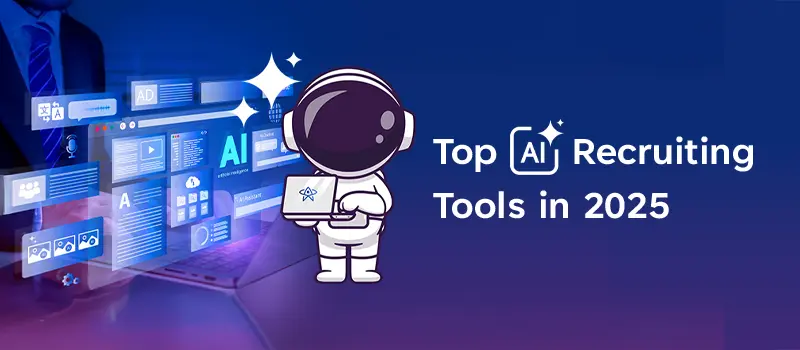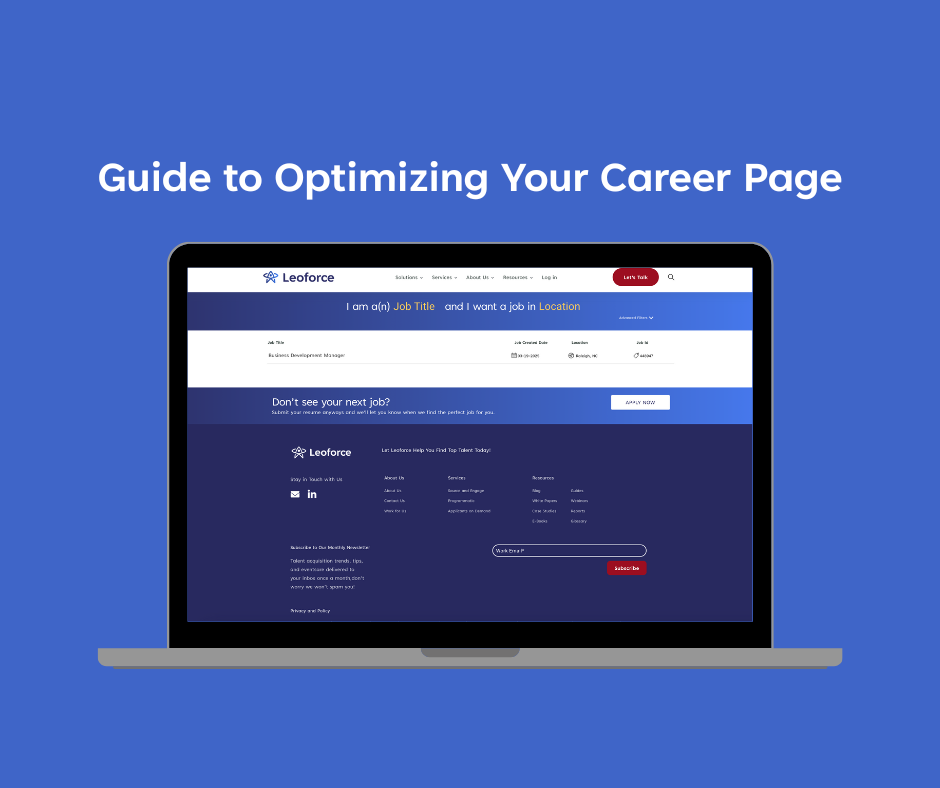How AI Can Help Strategize and Scale Candidate Engagement Post-pandemic

Cryptocurrency and the Metaverse can move over, the biggest ever tech explosion is taking place right here, right now and literally everyone is trying to cash in on this cow. There is no denying that the artificial intelligence systems are taking over the world. Businesses of all sizes and functions are actively looking to embed artificial intelligence into everyday processes. Machine learning is not only helping businesses take care of monotonous and mundane tasks like tax filing and customer service, it is also helping them with complicated processes like cybersecurity and data analytics. McKinsey & Company, in a report, suggested that at least 30% [1] of tasks in 60% of jobs could be done using machine learning.
With almost all functions of the workplace ecosystem employing artificial intelligence, why should Human Resources be left behind? This article explores how artificial intelligence is helping human resource officers strategize and scale candidate engagement in a post pandemic landscape.
Let’s ask the big questions first. What is candidate engagement in recruitment? More importantly, why is candidate engagement such a big deal in today’s recruitment scenario?
Before we understand what is candidate engagement, here are some quick insights into why candidate engagement matters.
- A Talent Board report stated that 53% of candidates in a survey audience revealed that employers and recruiters can take longer than 3 months to respond to a job application, sometimes not at all.
- In a report by IBM, it was stated that a whopping 30% of candidates interested in joining an organization prefer to join because of positive candidate experience.
- Careerarc’s survey report suggested almost 70% of candidates want organizations to optimize the recruiting process.
- SHRM reported a 60% drop out rate among candidates because the application filing process was overly complicated.
- As per Forbes, 72% of candidates are highly likely to call out organizations for a negative candidate experience – directly impacting their reputation.
While there is no specific definition for candidate engagement, it is essentially the process of ensuring constant communication with candidates at every step of the recruitment process.
Today, recruitment is not just limited to successfully bringing candidates in the door. Candidate engagement is a significant step in inbound recruitment processes and ensures that candidates get a well rounded overview of an organization’s work culture from the get go. There is also the obvious benefit of a decrease in the applicant drop out rate. Like customer experience, candidate experience is also receiving prominence. After all, a candidate also counts as an external stakeholder to an organization.
Fundamentally, candidate engagement is mapped across five essential steps. Let’s understand these steps and learn where artificial intelligence can come into play while carrying out these steps.
Using AI to engage with candidates at the awareness stage
Machine learning is typically introduced to carry out tasks at the grassroots. This obviously means it could be highly beneficial for Human Resources to incorporate artificial intelligence at the very beginning of the candidate engagement process.
While AI can help recruiters quickly filter through hundreds and thousands of job applications, it can also help recruiters fill out their application forms and answer any questions or queries that applicants might have about the job opportunity and the organization. An AI chat bot can easily walk applicants through the application filing process. AI can also be used by applicants to upload existing resumes or plug in resumes from job boards like LinkedIn and easily fill out applications. AI can help ensure that the drop out rate while filing job applications be brought down significantly.
Using AI to engage with candidates at the candidate consideration stage
Once the candidates have expressed interest in an open opportunity, their applications must reviewed. LinkedIn says that any job posting receives around 250 applications on an average. Obviously an organization is not going to move all 250 applications to the next step. They are likely to zero in on about 10% of the interested applicants and move them toward the next round. But what happens to the rejected pool of applicants? If there is an average waiting period of 2-3 months for potential candidates to wait for a response; and finally hear that their application has been rejected, it throws doubts on the organization’s work culture. After all, a rejected candidate is not going to be afraid of calling out an organization for its poor engagement skills.
Through machine learning, HR managers can set up auto responders and let candidates know about the status of their application. In fact, HR managers can use AI to go a step further and encourage applicants to sign up for job alerts and build a database of interested potentials for faster recruiting in the future.
Using AI to engage with candidates at the candidate interest stage
Traditional recruitment practices like hiring on the basis of educational qualifications and past experience are phasing out fast. Today, organizations are looking at understanding a candidate’s hands on knowledge and skill set that will help them survive and thrive in a work place. That is why organizations usually offer assessments to shortlisted candidates. Using artificial intelligence, these assessments can be marked and analyzed for candidate aptitude. AI can even point out any unethical practices while attempting the assessments. That’s right, no cheating! Imagine having to assess coding tests for hundreds of candidates during a campus recruitment drive. It is time consuming, it is expensive and there is a high risk of assessor bias. But these challenges can be easily overcome using machine learning. This step also pushes the most eligible candidates forward, making the HR officer’s job a lot easier.
Using AI to engage with candidates at the candidate evaluation stage
If you are wondering whether artificial intelligence can be used to negotiate salaries, then yes, it can. A 2017 Pew Research Center survey stated that 1 in 4 employed women said they have earned less than a man[2] doing the same job. Often, salary offers are based off of industry best practices, current economy, race, gender, the organization’s capacity to pay and sometimes, just what HR believes is the right offer as per their gut. But candidates don’t want an offer letter based off of someone’s gut feeling, do they? Here’s what AI can do to help.
AI removes the personal bias and does not discriminate and suggest offering a lower salary because of factors like a candidate’s age, gender, or race. What AI can actually do is help level the playing field, perhaps even decrease the gender pay gap. Using AI, HR officers can gather actionable insights into the current job market and easily match it with the candidate’s expectations – this gives candidates an equal opportunity and boosts an organization’s image as an equal opportunity recruiter.
Using AI to engage with candidates at the candidate closing stage
Organizations often face candidate drop out after days, weeks and months of of assessments, reviews, interviews and salary negotiations. That is why it is critical to keep candidates engaged even after rolling out an offer letter. Here’s where artificial intelligence can prove to be handy. With AI, Human Resources can easily design and conduct e-learning courses and make use of interactive materials to keep candidates engaged during the onboarding process. AI can be used to help with product and brand training, HR orientation, regulatory and compliance training, workplace culture indoctrination and even soft-skills training. The use of artificial intelligence in candidate onboarding is becoming very popular as it saves Human Resources a lot of time and is a lot more efficient than manual onboarding. Moreover, with remote operations becoming the new normal, it is a much easier for larger organizations to onboard a large number of candidates simultaneously.
Human Resources around the world are leveraging the power of AI to enhance the candidate experience at multiple stages of recruitment with a view to build an end-to-end holistic candidate integration and onboarding experience. Now that you know how artificial intelligence can be used to optimize candidate engagement, is your organization’s HR department ready to hop on to the AI bandwagon?
References
[1] https://www.mckinsey.com/featured-insights/future-of-work/the-future-of-work-in-america-people-and-places-today-and-tomorrow
[2] https://www.pewresearch.org/fact-tank/2019/03/22/gender-pay-gap-facts/





